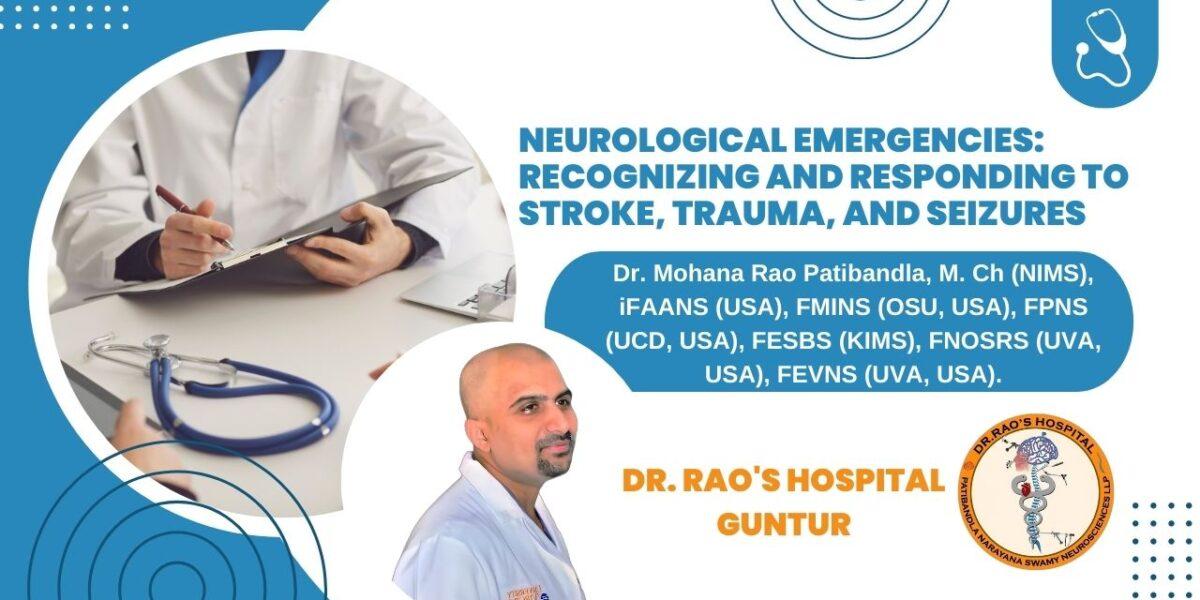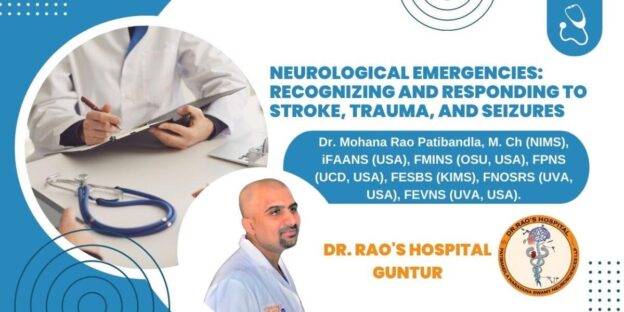Neurological Emergencies: Recognizing and Responding to Stroke, Trauma, and Seizures
Neurological Emergencies: Recognizing and Responding to Stroke, Trauma, and Seizures
Learn how to identify and respond to common neurological emergencies like stroke, trauma, and seizures. Discover the expertise of Dr. Rao, the best neurosurgeon in India from Guntur, practicing at Dr. Rao’s Hospital, a leading neurosurgery hospital in India.
Introduction
Neurological emergencies require quick recognition and appropriate responses to ensure the best outcomes. This blog will discuss how to identify and respond to three common neurological emergencies: stroke, trauma, and seizures. We will also highlight the expertise of Dr. Rao, the best neurosurgeon in India from Guntur, who practices at Dr. Rao’s Hospital, the leading neurosurgery hospital in India.
Recognizing Stroke
- A stroke is a severe condition caused by interrupted blood flow to the brain.
- Common signs include sudden numbness or weakness on one side of the body, difficulty speaking, and severe headaches.
- If you suspect a stroke, remember to act FAST: Face drooping, Arm weakness, Speech difficulty, Time to call emergency services.
Responding to Stroke
- Call emergency services immediately if you suspect a stroke.
- Stay with the person and provide reassurance until medical help arrives.
- Do not give them anything to eat or drink, as they may have difficulty swallowing.
Identifying Traumatic Brain Injury (TBI):
- Trauma to the head can lead to a traumatic brain injury.
- Symptoms may include confusion, loss of consciousness, severe headache, and vomiting.
- If someone experiences a head injury and exhibits these signs, seek immediate medical attention.
Responding to Traumatic Brain Injury
- Call emergency services right away if there is a suspected traumatic brain injury.
- Keep the person still and avoid moving their head or neck.
- If they are unconscious and not breathing, perform CPR if you are trained.
Recognizing Seizures
- Seizures occur due to abnormal electrical activity in the brain.
- Symptoms include uncontrolled shaking, loss of consciousness, confusion, and staring spells.
- If someone experiences a seizure, protect them from injury by clearing the area and cushioning their head.
Responding to Seizures
- Stay with the person during the seizure and time its duration.
- Do not restrain them or put anything in their mouth.
- After the seizure, help them into a recovery position and provide comfort.
Dr. Rao: The Expert Neurosurgeon in India
- Based in Guntur, Dr. Rao is a highly skilled neurosurgeon specializing in treating neurological emergencies.
- With extensive experience and advanced training, Dr. Rao offers expert care at Dr. Rao’s Hospital, a top neurosurgery hospital in India.
- Patients benefit from his expertise and personalized treatment plans for improved outcomes.
Conclusion
Recognizing and responding to neurological emergencies like stroke, trauma, and seizures is crucial for ensuring prompt medical intervention. Remember the signs and symptoms of each condition and act quickly by calling emergency services. Dr. Rao, the best neurosurgeon in India, brings his expertise to Dr. Rao’s Hospital, where patients receive exceptional care for neurological emergencies. By being aware and taking appropriate action, we can help improve outcomes and provide better support for those experiencing neurological emergencies.


